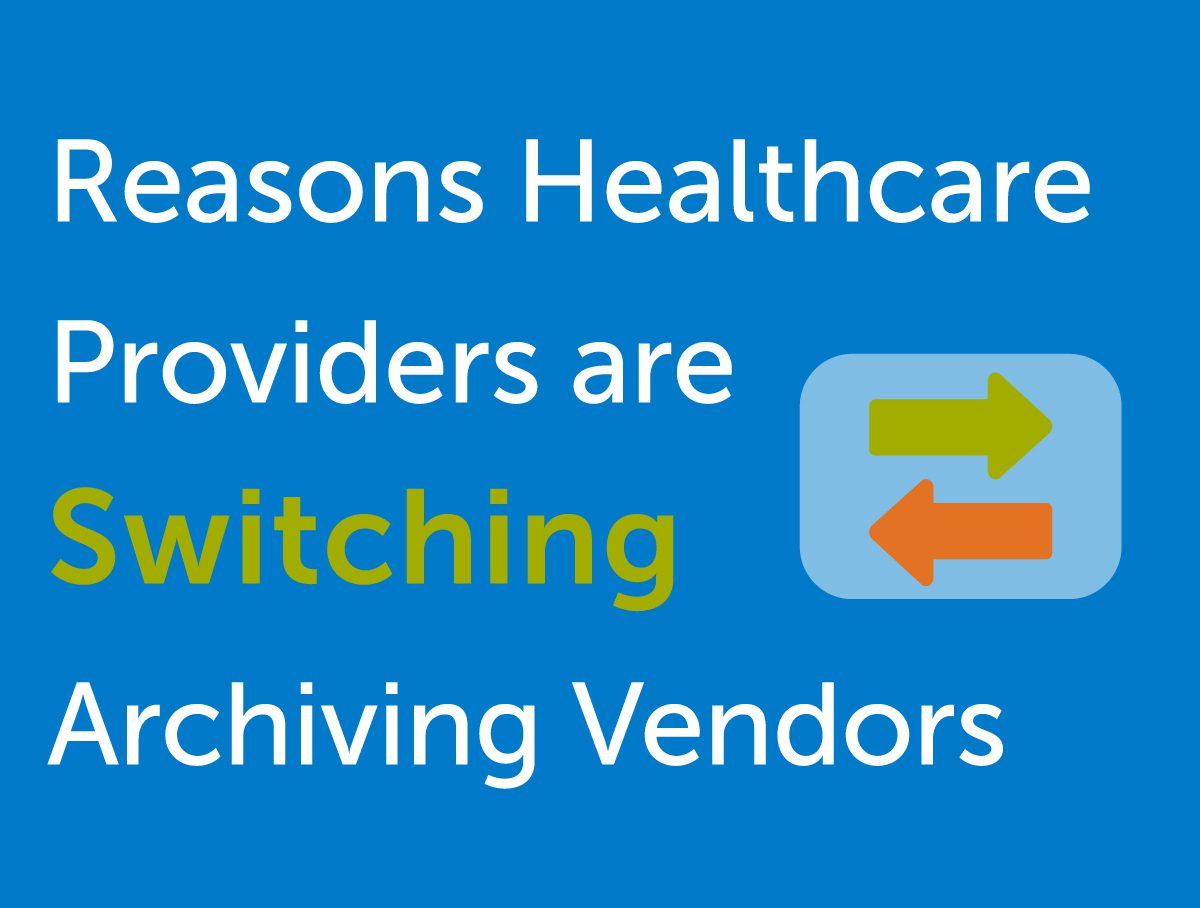
There are numerous factors that require healthcare providers to include an active archive solution in their information technology (IT) mix. A few of these factors include merger and acquisition activity, EHR system replacement, and the duration of record retention required by geographical state, facility type or medical specialty. Archives are important to a healthcare organization’s overall data management strategy as they streamline the IT portfolio (which can include up to hundreds of software applications in larger enterprises) as well as allow for the decommissioning of outdated legacy systems that lack in functionality and can leave the organization at risk for technical failure or data breach.
When it becomes necessary for healthcare providers to switch archive vendors
A recent article citing an industry report states that healthcare providers are focused more than ever on finding a health data archiving vendor that meets their needs with the right price, sales experience and system functionality. The article also highlights that it is becoming more common for a hospital to switch its archive vendor when that vendor falls short by missing data, not meeting timelines, or lacking integration points with major electronic health record (EHR) systems like Epic, Cerner, and MEDITECH.
Harmony Healthcare IT is an “archiver of archives”
Harmony Healthcare IT, an award-winning data management firm, is frequently called upon by large hospitals and health systems to archive an application portfolio of legacy systems as well as an existing archive of one of its competitors. Reasons why Harmony Healthcare IT rescues large healthcare enterprises from legacy data management projects that have gone off track with other archiving vendors vary, but, here are three case studies:
AltaMed. When 27 terabytes of complex dental records halted an archiving project at a community health network in Southern California, Harmony Healthcare IT dug into handling the odontogram records that stumped the original archiving vendor. As a result, Harmony Healthcare IT delivered a customized legacy data management solution with a seamless integration between the archived records and the go-forward production system, Epic. Read the story in Healthcare IT News.
Parkview Health. A nonprofit, community-based health system in the Midwest migrated to a new EHR which displaced 50 other clinical systems with legacy data in need of archiving. The first archiving vendor selected for the job didn’t meet Parkview’s expectations for the process, the timeframe, or the end product. Because of this, Harmony Healthcare IT was called in to provide a cohesive strategy, rescuing the archive initiative to get the system decommissioning schedule back on track. “Our archiving project is moving forward with success because of Harmony Healthcare IT,” explained Rick Miller, IS Director of Corporate Solutions at the time of the archiving vendor switch. Read more in this case study.
Children’s Minnesota. When Children’s Minnesota determined that its originally-selected archiving vendor wasn’t meeting their expectations, the health system turned to Harmony Healthcare IT to complete its legacy data management initiative. Watch the Healthcare IT Today interview with CIO Dave Lundal to hear tips on what to look for in an archive vendor and solution to get the selection right the first time.
Nine lessons learned from providers who have replaced archive vendors:
- Inventory your legacy systems. Take due time to document a complete inventory of legacy systems targeted for decommissioning and archival.
- Choose a proven archive vendor. Ensure the archiving vendor has experience extracting and migrating data from the name brands and data set sizes that are in your legacy system inventory. Large, multifaceted programs require more experience than a straight-forward, one system archival project.
- Involve your Data Governance team. Meet regularly with a cross-functional team to document archival requirements, record retention and destruction needs, and other project-related issues.
- Archive sooner than later. To save cost and avoid losing subject matter experts that know the legacy systems, archive early in the EHR implementation process—especially when acquiring or merging with new practices or hospitals.
- Dedicate archiving staff. Appoint a lead program manager to serve as the main point of contact for all archiving and related EHR integration projects.
- Involve subject matter experts. Ask end users of the archive—such as representatives of the clinical, HIM and Account Receivable teams—to evaluate the user interface and workflows of the active archive solution to strengthen support and user satisfaction.
- Make archive security a priority. Ensure that the archiving vendor selected to store your protected health information commits the necessary security resources, measures and controls. Here are 10 privacy and security questions to ask your archiving vendor.
- Integrate the archive with your EHR. In a hospital setting, linking the archive to the active EHR (i.e., Epic, Cerner or MEDITECH) with patient matching and Single Sign-On functionality is a best practice to ensure in-context access to historical records.
- Document an archival strategy. Formally document a solid legacy data management strategy to serve as a foundation for future consolidation of legacy patient records and to help streamline the IT portfolio as acquisitions are made or community entities are onboarded (i.e., through Epic Community Connect or Cerner Community Works).
Health data management is a big job that is getting bigger. Data volumes continue to outpace every other industry, 21st Century Cures Act requirements must be followed, and record retention periods often require 20+ years of storage. Each of these points make active archiving an important solution to keep patient, business, and employee records accessible, usable, interoperable, secure and compliant.
Active archiving is a smart move forward. Harmony Healthcare IT can help make sure you don’t take a step backward, losing time and money. Harmony Healthcare IT also can help if you need a strong partner to finish a stalled project.
Our team has been consistently ranked as the #1 data extraction, migration, and archival healthcare IT company according to Black Book Market Research for three years (2019-2021) as well as ranked #1 in the 2020 Best in KLAS Software & Services Report as a Category Leader in Data Archiving.






